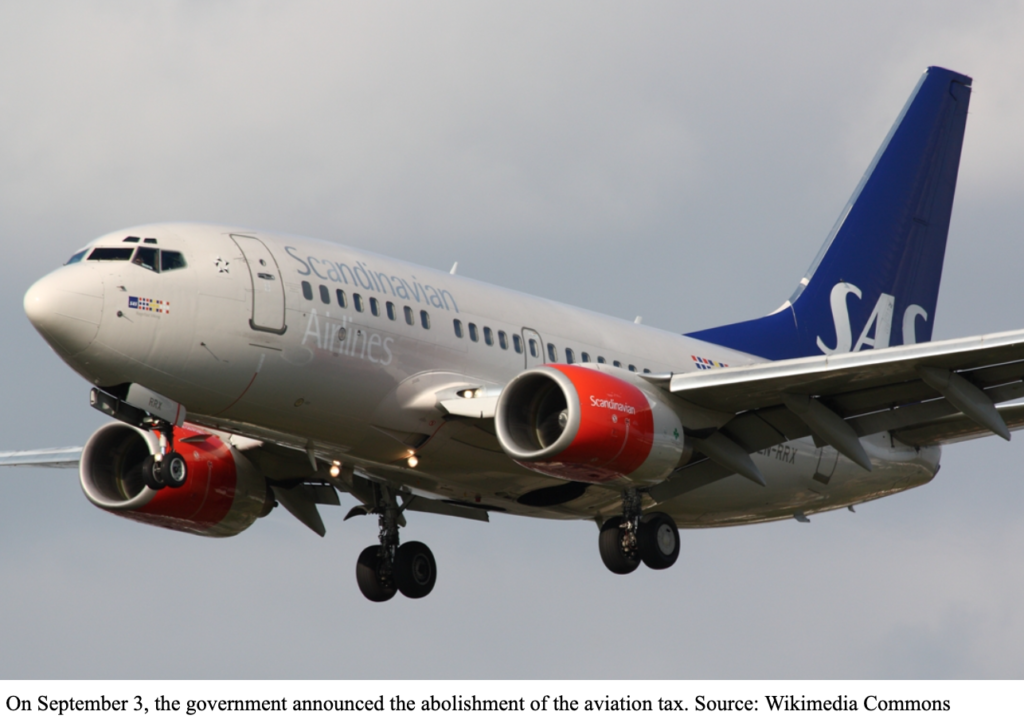Since the national elections in 2022, Sweden’s centre-right government has struggled to maintain its green credentials, rolling back many of its predecessors’ climate initiatives. On September 19th, the ruling coalition will present its 2025 budget proposal to parliament, featuring policies poised to further erode Sweden’s environmental reputation – all to appease taxpayers.

The minority coalition – comprising the liberal-conservative Moderate Party (M), the Liberals (L), and the Christian Democrats (KD) – depends on the support of the Sweden Democrats (SD), an anti-immigration party not precisely famous for its environmental enthusiasm. Last October, these parties inked the Tidö Agreement with SD, which strikes a curious balance by declaring Sweden’s climate policy “ambitious” while skirting any significant climate mitigation efforts.
The symbolism was evident when it was Linda Lindberg – a representative of the Sweden Democrats – who announced the decision to abolish the Swedish aviation tax on September 3rd, seemingly on behalf of a government to which her party does not technically belong. The aviation tax was introduced in 2018 to curb emissions from air travel, and with its abolishment, passengers will save 82 SEK (seven euros) for domestic and European flights and 325 SEK (28 euros) for transcontinental flights. The abolishment of the tax is being sold as a boon to Swedes in distant regions like Skåne in the south and Norrland in the north, who are more likely to travel domestically by plane. The government has been accused of neglecting these two regions, which have been disproportionately affected by inflation and high energy prices. However, no matter who is supposed to be appeased, the tax cuts will apply to all flights, whether business travels to Malmö or pleasure trips to Ibiza. Necessity is not a factor in consideration and all environmental concerns are thrown out of the aeroplane window.
On the other hand, some economists have presented legitimate criticism of the aviation tax. For instance, Runar Brännlund, an economics professor at Umeå University, argued in an article published last year in Tidningen Näringslivet that the tax is ineffective and a tool for political greenwashing. At the very least, it is worth noting that the tax has been applied indiscriminately on all flights irrespective of actual emissions, thus leaving no room for incentives to make air travel more environmentally friendly. As such, producers have been neglected, and all incentives have only been considered in relation to consumers whose demand has proven relatively flexible. While this criticism goes far in discrediting the current format of the aviation tax, it does not do much to justify the government’s decision to abolish it outright. The aviation tax could be reformed to consider producer incentives, but the coalition seems more interested in demolishing the entire structure rather than fixing its flaws.
Simultaneously, the first-class seats are reserved for further tax reductions, including a tax cut on petrol and diesel. Finance Minister Elisabeth Svantesson (M) claims that tax cuts are essential to lift the Swedish economy out of the recession now that inflation is cooling down again. Yet, whether these cuts will boost consumption and growth is debatable. A key component of the proposal is a cut to the withholding tax on dividends, a move that disproportionately benefits high-income earners with significant investments. This seems more likely to encourage saving than spending. It’s as if the centre-right government has forgotten Keynesian economics entirely – neglecting infrastructure and public transit investments that could offer more reliable, long-term economic growth.
Nevertheless, Romina Pourmokhtari, the Minister for Climate and the Environment, insists that Sweden is en route to reaching their climate goals. The government plans to increase the so-called “reduction duty,” requiring fuel producers to blend more biofuels into petrol and diesel – raising the biofuel content from six to ten percent – to reduce Greenhouse Gas (GHG) emissions. Climate activists may welcome this, but it’s worth noting that even with this increase, the reduction duty will still fall short of where it was before the current government took office.
Despite the insignificant proposed increase in the reduction duty, the responsible parties did their best to minimise backlash from car drivers across the country. Shortly after the announcement, the Sweden Democrats explained in an email to the news agency TT Nyhetsbyrån that fuel prices would not be impacted by the reforms, assuring potential voters that the state would cover all the costs, thus removing any environmental incentives. Pourmokhtari’s confidence rests on an evaluation by the Ministry of Finance based on data from the Swedish Environmental Protection Agency. However, the Minister for Climate and the Environment failed to highlight that the Environmental Protection Agency provided two scenarios for the government’s climate efforts. As recently reported by Sveriges Television (SVT), the Swedish public service company (article in Swedish), only the first scenario indicates that the Swedish government will reach its environmental goals. This, if anything, proves that while facts may be blind, the selection of facts certainly is not. As long as the government continues to cherry-pick data to soothe taxpayers, Sweden’s green reputation remains threatened, and the taxpayer’s dream can quickly become an environmental nightmare.


